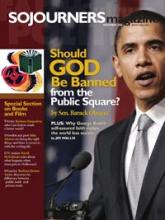As the nation observed the fifth anniversary of the 9/11 attacks, President George Bush faced growing public disapproval of the war in Iraq. So the Bush administration launched a new offensive to defend its disastrous war, turning unified national mourning into bitter partisan political debate.
First the president delivered a series of speeches in which he equated his war in Iraq with the war on terror, despite widespread public opinion that the Iraq war is both a failure and a distraction from the real battles against terrorism. Then he again became “theologian-in-chief,” using stark imagery of good and evil and language about the “clash of civilizations” to defend his apocalyptic mission. A classified National Intelligence Estimate done by 16 U.S. intelligence agencies, which came to light in September, warned that the war on Iraq has increased, not lessened, the threat from terrorism and has spawned a “new generation of Islamic radicalism,” according to The New York Times. The administration’s response has been to attack its critics’ integrity, motives, and patriotism. The president has become even more self-confident, declaring, “I’ve never been more convinced that the decisions I made are the right decisions.”
Vice President Dick Cheney took his usual low-road approach of attacking critics of the war as appeasers, accusing them of giving aid and comfort to terrorists. Defense Secretary Donald Rumsfeld invoked the precedent of Hitler and suggested that critics of the war would have been soft on Nazism and fascism too. Republican House Majority Leader John Boehner showed just how low politicians can go by saying, “I listen to my Democrat friends, and I wonder if they’re more interested in protecting the terrorists than in protecting the American people.” Whatever happened to honest and civil debate?
Read the Full Article
